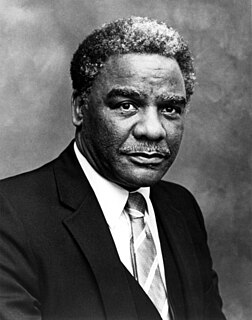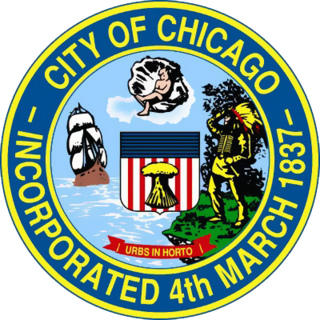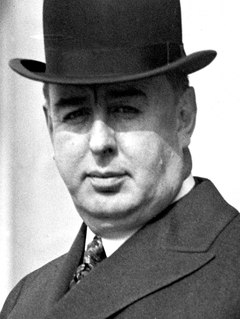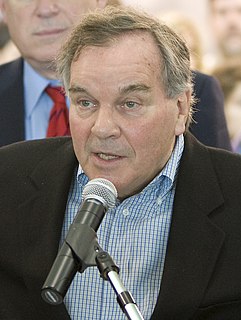
Harold Lee Washington was an American lawyer and politician who was the 48th Mayor of Chicago. Washington became the first African–American to be elected as the city's mayor in February 1983. He served as mayor from April 29, 1983 until his death on November 25, 1987. Earlier, he was a member of the U.S. House of Representatives from 1981 to 1983, representing Illinois' first district. Washington had previously served in the Illinois State Senate and the Illinois House of Representatives from 1965 until 1976.
The 1968 Democratic National Convention was held August 26–29 at the International Amphitheatre in Chicago, Illinois. As President Lyndon B. Johnson had announced he would not seek reelection, the purpose of the convention was to select a new presidential nominee to run as the Democratic Party's candidate for the office. The keynote speaker was Senator Daniel Inouye (D-Hawaii). Vice President Hubert H. Humphrey and Senator Edmund S. Muskie of Maine were nominated for President and Vice President, respectively.

The Mayor of Chicago is the chief executive of Chicago, Illinois, the third-largest city in the United States. The mayor is responsible for the administration and management of various city departments, submits proposals and recommendations to the Chicago City Council, is active in the enforcement of the city's ordinances, submits the city's annual budget and appoints city officers, department commissioners or directors, and members of city boards and commissions.

The city of Chicago, Illinois held a nonpartisan mayoral election on Tuesday, February 22, 2011. Incumbent Mayor Richard M. Daley, a member of the Democratic Party who had been in office since 1989, did not seek a seventh term as mayor. This was the first election since 1947 in which an incumbent mayor of Chicago did not seek reelection.

The Chicago mayoral election of 2007 saw incumbent mayor Richard M. Daley won a landslide victory, garnering a 51-point margin of victory.

The Chicago mayoral election of 1999, which took place on February 23, 1999, resulted in the re-election of incumbent Richard M. Daley over Bobby Rush, with 428,872 votes to Rush's 167,709. Daley garnered a landslide 71.9% of the total vote, winning by a 44 point margin. This was the first officially nonpartisan Chicago mayoral election, per a 1995 Illinois law.

The Chicago mayoral election of 1995 resulted in the re-election of Democratic Party nominee incumbent Richard M. Daley over independent candidate Roland Burris, with 359,466 votes to Burris's 217,024. Daley won 60.1% of the total vote, winning by a landslide 24-point margin. The Republican candidate, Raymond Wardingley, fared poorly, with only 2.8% of the vote. The fourth nominee, Lawrence Redmond of the Harold Washington Party, won 0.9% of the votes. This was the last election for Mayor of Chicago where candidates ran under party labels.

The Chicago mayoral election of 1991 resulted in the re-election of incumbent Democrat Richard M. Daley to his first full-term. Daley had previously been elected to serve the remainder of Harold Washington's unexpired term in a special election held following Washington's death in office.

The Chicago mayoral election of 1989 saw Democratic nominee Richard M. Daley win election to the remainder of an unexpired mayoral term with a 14% margin of victory. This marked a return for the Daley family to the office of mayor. Daley was elected over Alderman Timothy Evans, the nominee of the newly formed Harold Washington Party, and the Republican nominee Ed Vrdolyak.

The Chicago mayoral election of 1987 was first the primary election on February 24, 1987 followed by the general election on April 7, 1987. The election saw the re-election of Chicago, Illinois' first African-American mayor, Harold Washington. Ed Vrdolyak, the leader of the Vrdolyak 29, unsuccessfully opposed him, running on Solidarity ticket. Former mayor Jane Byrne, who served from 1979 until 1983 unsuccessfully challenged Washington in the Democratic primary.

The Chicago mayoral election of 1983 was first the primary on February 22, 1983 which was followed by the general on April 12, 1983. The election saw the electing of Chicago, Illinois' first African-American mayor, Harold Washington. Incumbent Mayor Jane Byrne, who had served since April 1979 had lost renomination in the Democratic primary in a three–way race between herself, then–Congressman Washington, and then–State's Attorney Richard M. Daley in February 1983. Washington would face off against Republican nominee Benard Epton, winning with a 3.7% lead over Epton in the general election.

An election for Mayor of Chicago was held on February 26, 2019. The election is officially nonpartisan; the winner will be elected to a four-year term. Since no candidate received a majority of votes, a runoff election will be held on April 2, 2019 between the two candidates with the most votes. The elections are concurrent with the 2019 Chicago aldermanic elections that will elect all 50 members of the Chicago City Council, as well as with elections for City Clerk of Chicago and City Treasurer of Chicago.

Chicago has held regularly-scheduled popular elections to select the city's mayor ever since it was incorporated as a city in 1837.

In the Chicago mayoral election of 1971 Richard J. Daley was elected to a fifth term as mayor, defeating Republican Richard Friedman by a landslide 40% margin.

In the Chicago mayoral election of 1955 Richard J. Daley was elected to his first term as mayor by a ten point margin.

In the Chicago mayoral election of 1915 Republican William H. Thompson defeated Democrat Robert Sweitzer.

In the Chicago mayoral election of 1947 Democrat Martin H. Kennelly defeated Republican Russell Root by a more-than 17% margin of victory.

The Chicago mayoral election of 1883 saw Democratic incumbent Carter Harrison Sr. defeat Republican Eugene Cary by a double-digit margin. The election took place on April 3, 1883.

The Chicago mayoral election of 1881 saw Democratic incumbent Carter Harrison Sr. defeat Republican John Clark, winning a majority of the vote and a nearly twelve point margin of victory.














